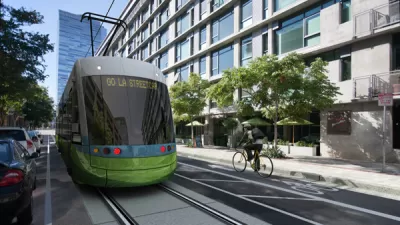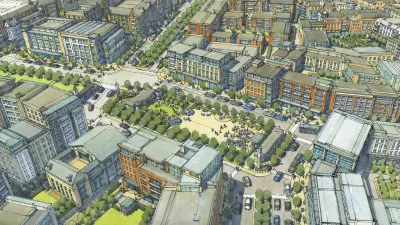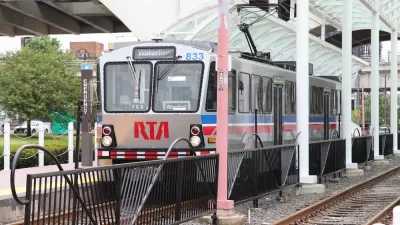David Alpert and Jarrett Walker go head to head debating the merit of streetcar systems in many United States cities and suburbs and their efficiency at creating urban, walkable communities.

Recently, there have been many critics of cities building streetcar systems as a form of mass transit. In a post on CityLab, David Alpert defends the streetcar transit system, stating that while perfect transit with frequent, speedy service is the goal, good transit (despite some of its shortfalls) is still worth supporting.
For Alpert, greater walkability and urbanization is a momentum game, "even an expensive, sub-optimal transit solution—such as a less-frequent streetcar with no dedicated lane —can push the cycle in the right direction. If it draws population and turns car drivers into transit riders even part of the time, then it will build political support for even better transit systems down the road.” Indeed, Alpert goes on to say that these streetcars can be especially helpful for street-space challenged cities, as they "can make up for a lack of lane space with their length, since they can be much longer than buses and carry more people more efficiently."
In a response to Alpert's post, Jarrett Walker of Human Transit attacked the streetcar as not achieving the main goals of mass transit, to provide access to happiness and economic mobility for large numbers of human beings. Walker questions Alpert's main assumptions, asking why should "the 'imperfect good that we start with' be the streetcar instead of a really liberating transit system run, for now, by buses? Why must we start with a hunk of decontextualized technology rather than our liberty and opportunity to go where we want to go?"
Walker's main qualm with Alpert's argument is his argument that streetcars can create the much needed walkable environments, in the United States, as current ones are too expensive for most to live in. Indeed, Walker explains how "[t]he sheer abundance of places that need to be made more walkable is actually the strongest argument against the streetcars-in-traffic campaign. In transit, if it doesn't scale, it doesn't matter. Streetcars-in-traffic have helped enrich a few superdense districts, but they are far too slow, unreliable, and expensive to scale to the size of our urban mobility problem—at least not as long as they remain stuck in traffic... If you want to see how a city massively expands the usefulness of transit, and thus the potential for transit-oriented lives, look to what is happening in Houston. Massive, scalable, high-frequency bus grids that are useful for getting all over the city, and that can be created now."
FULL STORY: Hey, Streetcar Critics: Stop Making 'Perfect' the Enemy of 'Good'

Study: Maui’s Plan to Convert Vacation Rentals to Long-Term Housing Could Cause Nearly $1 Billion Economic Loss
The plan would reduce visitor accommodation by 25,% resulting in 1,900 jobs lost.

Placekeeping: Setting a New Precedent for City Planners
How a preservation-based approach to redevelopment and urban design can prevent displacement and honor legacy communities.

Using Old Oil and Gas Wells for Green Energy Storage
Penn State researchers have found that repurposing abandoned oil and gas wells for geothermal-assisted compressed-air energy storage can boost efficiency, reduce environmental risks, and support clean energy and job transitions.

Washington State Plans Ambitious ‘Cycle Highway’ Network
The state is directing funding to close gaps in its existing bike network and make long-distance trips more accessible.

Homeowners Blame PG&E for Delays in ADU Permits
The utility says it has dramatically reduced its backlog, but applicants say they still face months-long delays for approvals for new electrical work.

Rethinking Wildfire Defense: How a Landscape Approach Can Protect Neighborhoods
Post-fire analysis of the Eaton Fire reveals that a landscape approach — including fire-resistant vegetation, home hardening, and strategic planning — can help reduce wildfire risk, challenging assumptions that trees and plants are primary fire hazards.
Urban Design for Planners 1: Software Tools
This six-course series explores essential urban design concepts using open source software and equips planners with the tools they need to participate fully in the urban design process.
Planning for Universal Design
Learn the tools for implementing Universal Design in planning regulations.
Borough of Carlisle
Caltrans
Heyer Gruel & Associates PA
Institute for Housing and Urban Development Studies (IHS)
City of Grandview
Harvard GSD Executive Education
Salt Lake City
NYU Wagner Graduate School of Public Service
City of Cambridge, Maryland





























